Performing artistes hail overhaul of copyright law as timely
Muhumuza urged that the law should empower URSB’s Copyright Directorate by boosting its staffing, noting it would serve as a neutral body without conflicts of interest.
The session between the House Committee on Legal Affairs and a team from the Uganda National Musicians Federation (UNMF) led by Michael Kalumba. (Credit: Miriam Namutebi)
_________________
Performing artistes have welcomed the tabling of the Copyright and Neighbouring Rights (Amendment) Bill, 2025.
They expressed their support on Wednesday, August 13, 2025, shortly after a session between the House Committee on Legal Affairs and a team from the Uganda National Musicians Federation (UNMF) led by Michael Kalumba.
Also present was the federation’s vice president, Sheebah Karungi.
While making his submission, Kalumba said the group, having participated in wide-ranging consultations and followed the process since the draft’s release, commended the Government for introducing the amendment.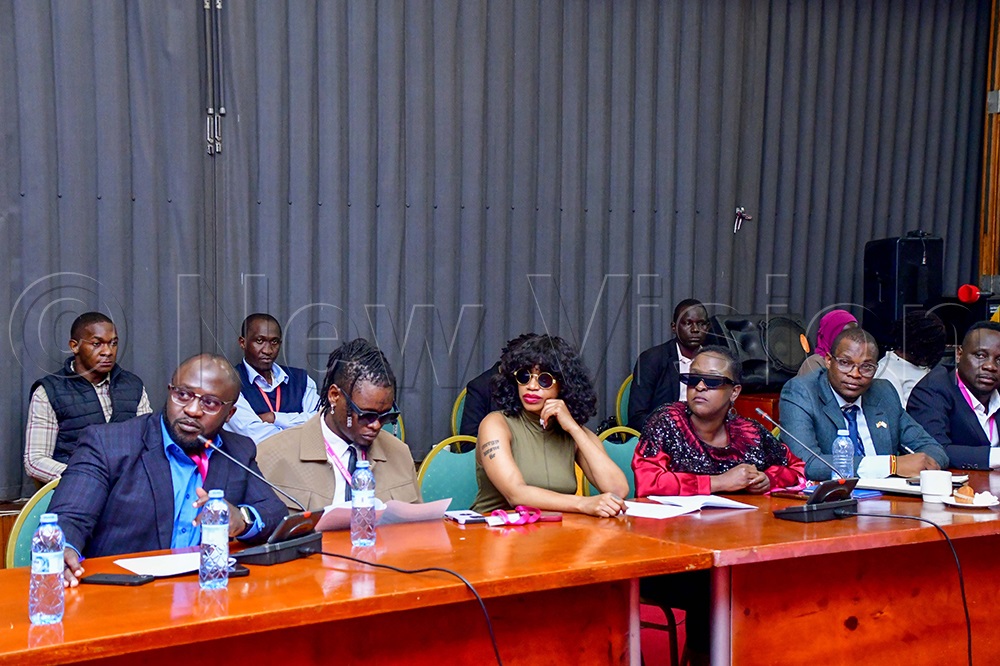
Artistes during the session between the House Committee on Legal Affairs and a team from the Uganda National Musicians Federation (UNMF) led by Michael Kalumba. (Credit: Miriam Namutebi)
He noted that it addresses critical gaps in the existing law and strengthens revenue collection mechanisms, among other provisions.
“We are in full support of the Bill as it is. Also understanding that there are some eliminations that were made at some levels,” Kalumba admitted.
One of the Achilles’ heels, according to musician Edrisa Musuuza alias Eddy Kenzo’s manager, Martin Muhumuza, who also doubles as UNMF’s director of research, was remuneration from caller-back ringtones (CRBT).
“For the past fifteen years, CRBT has been in the air. No one was regulating it; the telecom companies were doing as they deemed fit. Imagine the creator of these works was receiving only 1.8 percent collected,” Muhumuza explained.
“But we thank Government and colleagues who were part of this. And you, the Members of Parliament, for at least lifting this. At least the percentage is now clear and we hope it stays that way….” he added.
Clause 11 of the Bill seeks to insert, immediately after Section 39A of the Principal Act, a new remuneration structure for authors and performers whose works are used as caller ring-back tones. Under the proposal, the creator would receive 60 percent, while operators, including telecommunication companies, would take 31.5 percent and the aggregator 8.5 percent.
Muhumuza also thanked the framers for putting in place digital protection and enforcement mechanisms.
“Because the reason why we are all advocating for the amendment of this law is that there is a lot that has come since 2006, new streaming platforms, and there is a new domain that has come and is very busy with the digital content creation. Without digital protection, those people are just working in the dark,” he argued.
Muhumuza urged that the law should empower URSB’s Copyright Directorate by boosting its staffing, noting it would serve as a neutral body without conflicts of interest. He also called for simplification of the Bill’s language, arguing that many of its definitions are not easily understood by his colleagues.
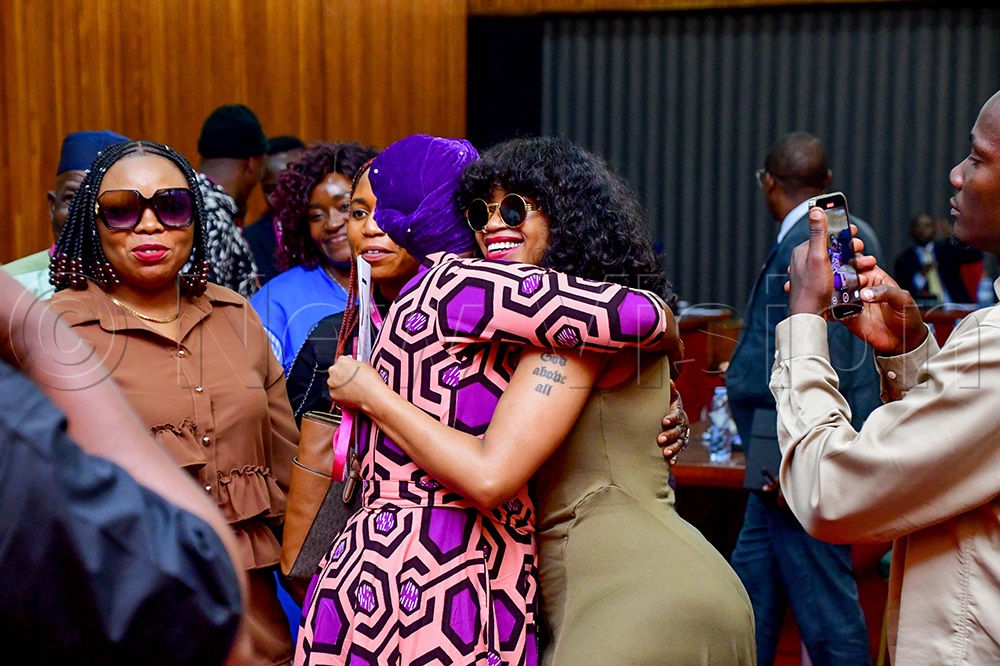
Sheebah Karungi and Halima Namakula embrace each otheer after meeting at Parliament. (Credit: Miriam Namutebi)
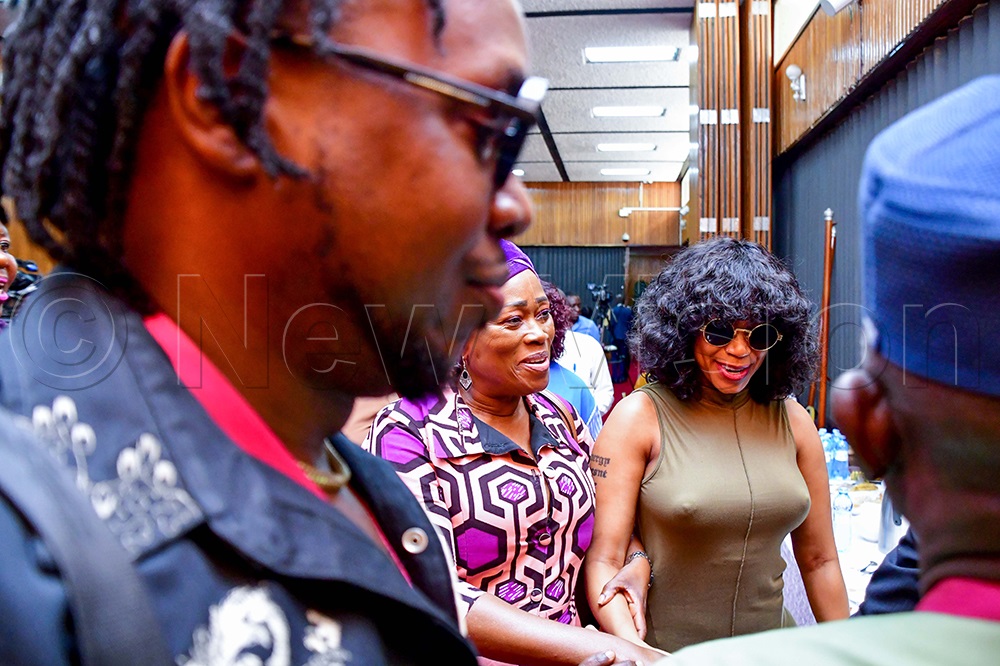
Artiste Sheebah Karungi and Halima Namakula at Parliament. (Credit: Miriam Namutebi)
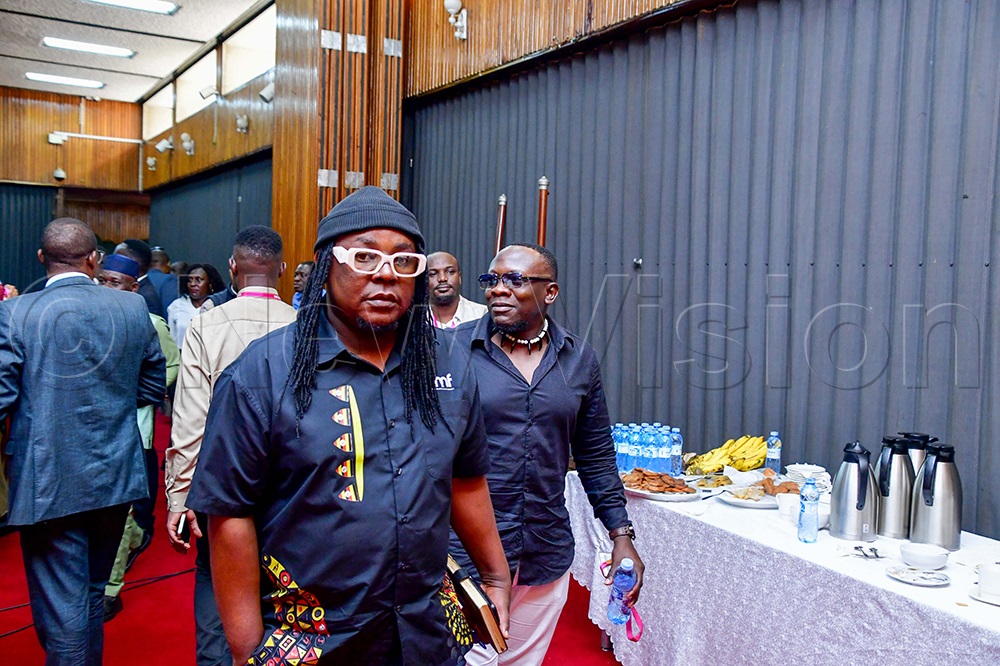
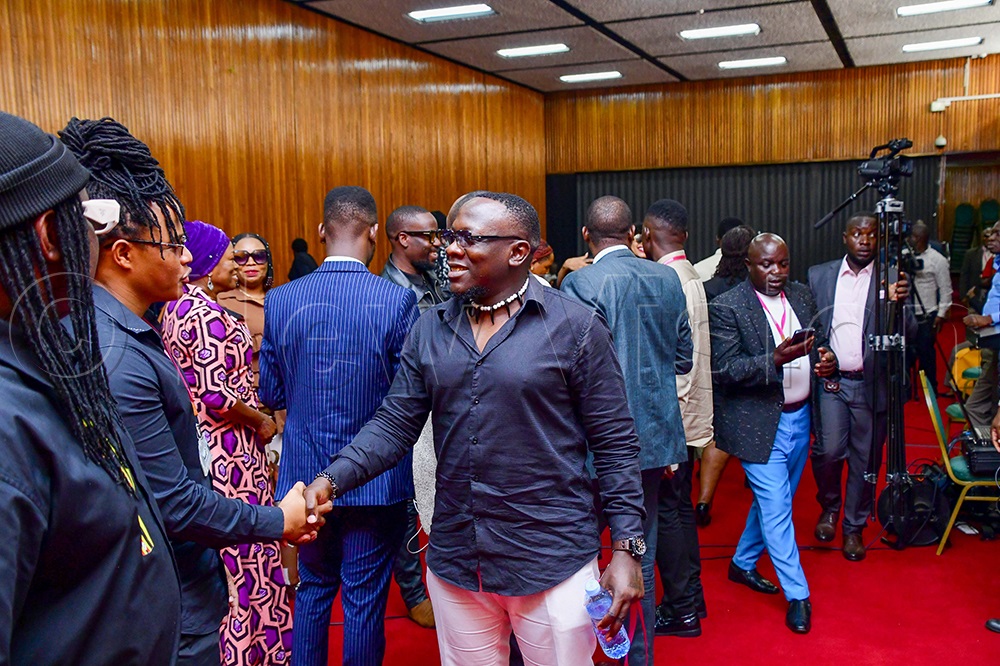
Musicians react
“This is our fight. I am sure every musician and creative is so happy,” Sheebah Karungi reacted.
Speaking to New Vision shortly after the interaction, Pius Mayanja, better known as
Pallaso, concurred with the framers and UNMF’s position, arguing that a lot has changed since the principal law was enacted in 2006.
“It has been way overdue because some of the devices and technology in operation right now didn’t exist during that time. The population of Uganda was much less; we are 40 million today. The media outlets that were handling our work, like televisions and radio stations, we only had one, which was Uganda Television (UTV) and Radio Uganda, which could be supervised by one person,” Mayanja said.
However, he noted that the media landscape is now flooded with outlets and also burdened with Artificial Intelligence (AI).
“If we enter AI before fixing digital, we will be headed in the wrong path,” he added.
“Other countries which have amended their copyrights, like Nigeria and China, have taken off. But it is never too late,” Mayanja pointed out.
Brand positioning
However, as musicians await their big break, Michael Onegui, alias Producer Rinex of Bogolako fame, advised fellow creatives to diversify their revenue streams to navigate the industry’s rugged terrain.
“I might not sing, but I make a beat, write a song and get an artiste to perform it. It is also another way of monetising one’s music besides selling beats online. I think producers should also focus on elevating their brands. There’s more that comes with this, like selling merchandise and lots of business,” Rinex explained.
In the past, musicians paid a fixed studio fee of about sh400,000 to record a song. He said the amount is now dependent on the time an artiste spends in the studio.
“I charge sh200,000 for one hour. For studio time, the more hours, the more money. If you spend five hours, that is sh1 million. But still, I have a package for upcoming artistes and slow learners. If I realise an artiste needs more time and a lot of guidance, I scrap the studio time and invite my creative team, and then we take you through the process of training and rehearsal,” Rinex said.
Private copying levy
While the Bill ignored calls to impose a private copying levy on digital transferable gadgets due to what Attorney General (AG) Kiryowa Kiwanuka said were fears that such a levy would raise the cost of products like laptops, smartphones, external hard drives and flash disks, on Tuesday gender and culture state minister, Peace Regis Mutuuzo, pushed back, insisting they had never agreed to drop the idea.
“It is something we have not agreed on as Government. While the Ministry of Justice and Constitutional Affairs feels that it will discourage, they are only looking at the academic area and even the argument of stating that somebody is not interested in listening to music, but if the other person on the other side of the call registered a caller back tune and you suddenly call or pick his phone call, won’t you listen to the music?” she posed.
“Even if you are not interested, you have listened to the music and therefore you have taken in the content. And I don’t think there are gadgets where we don’t read some people’s scripts; they are not common. So instead of addressing the character, let us address the concern,” Mutuuzo added.
Legal perspective
However, as the Baganda say, tomegga noluma (you cannot wrestle down someone and then bite him or her as well), some, like Kenneth Muhangi of the Uganda Law Society (ULS), believe the law is already deterrent enough.
“But this is an old debate that, in many instances, these creatives are the ones who give this content to the public to be able to use. And we feel that worldwide, streaming is something that has made things easier. Of course, that is also another discussion on how much they get. If I have a song on Spotify, Apple Music or any of these platforms on YouTube?” Muhangi said.
“They are now earning from their music or content played on these platforms. So, a levy like you are mentioning would add more taxes, and I feel would make it more difficult for people to be able to access services, since now mobile phones are also tied to things like financial inclusion and learning. So, if that levy is imposed, that makes it difficult to access these devices,” he added.
Muhangi made these remarks while appearing before the Legal and Parliamentary Affairs Committee.